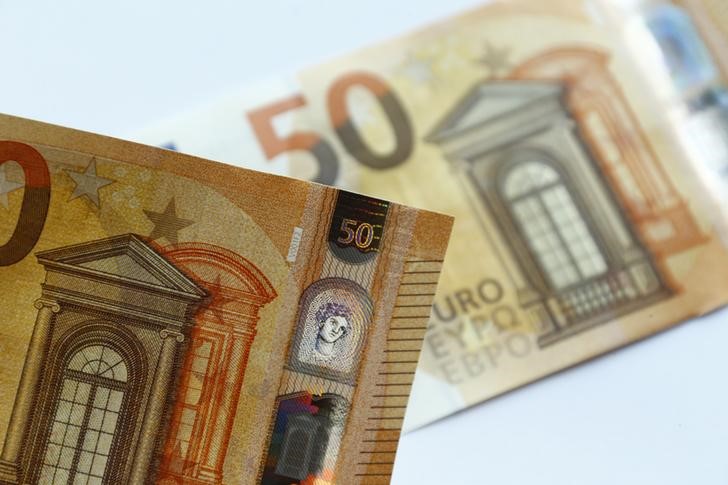 © Reuters. ECB Warns Against Complacency on Depressed Prices, Euro Gain
© Reuters. ECB Warns Against Complacency on Depressed Prices, Euro Gain(Bloomberg) — European Central Bank officials agreed at their latest policy meeting to avoid any complacency in their battle against the recession, and to counter investors’ perception that the euro would inevitably strengthen.
The of the Governing Council’s Sept. 9-10 meeting showed officials fretting that currency gains had offset some of their monetary stimulus, with a “material impact” on the outlook for consumer prices. Chief economist Philip Lane said inflation expectations were at “very depressed” levels and at risk of falling further.
“In the prevailing environment of high uncertainty, keeping a steady hand with respect to monetary policy was seen as most appropriate,” according to the document published Thursday. “At the same time, the case was made for keeping a ‘free hand’ in view of the elevated uncertainty.”
The euro’s rapid ascent to the strongest level in two years had emerged as a major headwind in the run-up to the gathering, and prompted the Governing Council to say it will closely monitor the exchange rate. Since then, the currency has dropped from its highs.
What Bloomberg’s Economists Say
“We expect the ECB to acknowledge the materially weaker outlook in October before raising PEPP asset purchases by another 600 billion euros in December.”
-Maeva Cousin. Read her ECB REACT
“It was suggested that it was the pace of the euro’s appreciation, rather than the level of the exchange rate, that could become a concern,” the ECB said. “It was not clear how persistent recent movements in the exchange rate would be, with volatility being high and the potential for movements in both directions.”
Policy makers stressed they will carefully assess all incoming information, including the currency, “to maintain flexibility in taking appropriate policy action if and when needed.”
Officials concluded that the 19-nation economy had performed broadly in line with previous expectations — though some argued President Christine Lagarde should adopt a more upbeat tone when describing the recovery.
The account made reference to remarks that the region’s second-quarter slump was “somewhat less pronounced than feared,” with growth in the following three months “likely to turn out higher than expected.” The extent to which the recovery would continue throughout the rest of the year was “less clear.”
Recently, the outlook has become more uncertain. Virus infections have accelerated sharply across most of the euro area, triggering fresh curbs on public life and travel that will be particularly harmful to services-reliant economies in Europe’s south.
The French statistics agency predicts the nation’s economy will likely stall in the fourth quarter, while the Bundesbank expects Germany’s recovery to slow.
Lagarde warned earlier this week that coronavirus containment measures pose a clear risk to the outlook and pledged not to remove monetary support until the crisis is over. Most economists predict the ECB’s 1.35 trillion euro ($1.6 trillion) emergency bond-buying program will be expanded this year — probably in December when new forecasts are published.
Executive Board member Fabio Panetta argued last month that the risk of delivering too much stimulus is smaller than being “too shy.” Bundesbank President Jens Weidmann countered on Wednesday that the economy is still growing “somewhat more quickly than expected” and warned against presuming that the ECB will act.
(Updates with comments from account starting in fifth paragraph.)
©2020 Bloomberg L.P.
Fusion Media or anyone involved with Fusion Media will not accept any liability for loss or damage as a result of reliance on the information including data, quotes, charts and buy/sell signals contained within this website. Please be fully informed regarding the risks and costs associated with trading the financial markets, it is one of the riskiest investment forms possible.




0 Comments:
Post a Comment